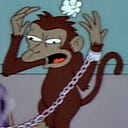‘The Oculus’ Interview: Jason Grote
To help alleviate my fears about the death of culture and the disintegration of human dignity in Late Capitalism’s maw, I have started an interview series with people doing good work in the world of arts, culture and/or politics. I’m particularly interested in how artists are navigating their way through a creative and financial environment that seems increasingly hostile to risk, innovation and any kind of quality.
It’s called “The Oculus,” after a now-defunct website I used to run, which served the same purpose.
Our first subject is Jason Grote, an accomplished writer of screen and stage whose TV credits include Mad Men, Hannibal and Smash, and whose plays include 1,001, Civilization (all you can eat) and This Storm Is What We Call Progress. His theater work has been developed and performed at dozens of venues across the world, and he has taught writing courses at schools such as UC San Diego, Point Park University and Rutgers University. He is currently working on the next iteration of the Bioshock game series for Cloud Chamber.
I had the opportunity to speak with Grote at the end of June, 2023. He spoke about his work, his influences and the implications of the current WGA strike.
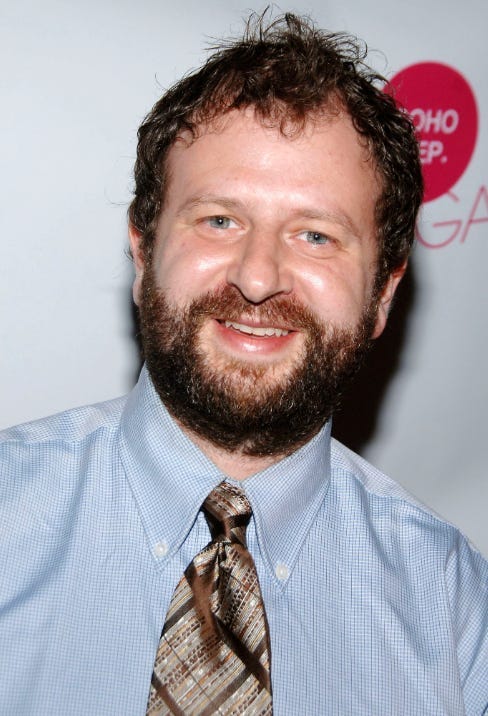
Q: Tell me a little about how you got started as a professional writer, and what you hold as some of your career highlights.
I studied theater in a little state school in New Jersey, and took a playwriting elective. I wrote a play that was fairly derivative of Albee’s The Zoo Story and John Patrick Shanley’s Danny and the Deep Blue Sea, about a time I was hit on in a men’s room late at night. I saw the guy a week or so later at his fraternity table — the school was so penny-ante that our Greek organizations had tables in the commuter cafe instead of houses — and, not realizing where I knew him from, said hi. He turned pale as a ghost, I realized who he was, and I decided to write a play about it. It won a prize and was produced, which felt great, was not that much of an achievement — the only other student who’d completed an entire play wrote one of the worst things I’ve ever read — but it was a rewarding experience and the actors did a terrific job.
After college I flailed, working with little go-nowhere theaters acting, directing, and writing, even having a not-great play in the NY Fringe Festival. Eventually I realized two things: (1) that I was more interested in writing than the other stuff, and (2) anyone with a writing career went to one of a handful of schools. I got into NYU and Columbia, and chose NYU because they offered me a scholarship, plus NYU was easier to get to from Williamsburg. 9/11 happened on the first day of class, and I wandered out to 8th street with my classmates, all strangers to each other, and we watched the first tower fall. I went to the nearest hospital and donated blood because I didn’t know what else to do. There were so many donors that day that the STD tests expired and they got a bunch of false positives for syphilis, so a few months after 9/11 I had to go get a syphilis test (I didn’t have it).
After school I stuck around NY and had a pretty good run as a playwright in the early 2000s, with work produced throughout North America and Europe. My best-received play was 1001, a sort of Borgesian take on the Arabian Nights that used Edward Said’s Orientalism as a philosophical scaffold. It’s probably a little dated today, partially because a white, secular Jew writing about Orientalism in the immediate wake of 9/11 meant something different in 2005–13 than it would today. Also my own politics, always to some degree materialist in the Marxian sense, have become much more so, and less about culture and identity. Modern American playwriting leans much more towards the latter, which has turned out to be one of my bigger frustrations with theater.
Right around when I left for LA, I collaborated with a theater/performance artist named David Levine called HABIT. It was very well reviewed, though the genius was David’s — it consisted of a little ranch house built in a gallery or warehouse space, and in the house, three actors were performing a 90-minute play on a loop. The audience could enter or leave at any point in the performance, and they could only see the show through doors and windows in the house. The script was a parody of the realism that dominated American stages at the time, but I had to play it straight — the project would have failed if I was winking at the audience.
Since I began writing for television, my biggest achievement is probably my Mad Men episode, which wound up on many top ten lists of the series. That one’s a little fraught, because obviously the show’s creator was its auteur, and all of the episodes bore his stamp, mine included. But there’s a lot of me in there too — people who watched it said it was very much like my plays, and now that I’m further away from it, I can see that.
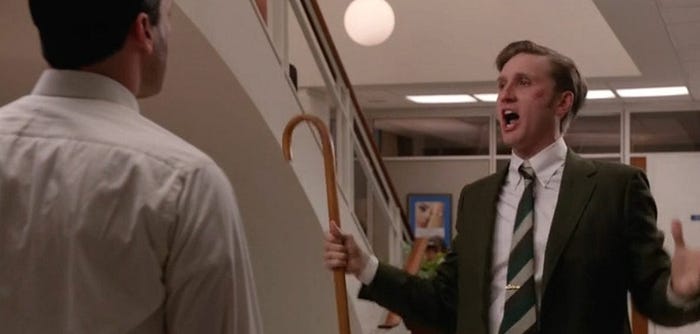
After moving to LA, my favorite theater project has been Tarzana, a collaboration with an under-known NY company called Radiohole — a strange thing to exist, because they’re a collaborative company that works without a playwright, director, or designer, and just makes shows themselves. But for a few years, they lost their space because of gentrification, and they had occasion to use a writer. I send them my own strange approximation of one of their pastiche shows, inspired by the artist Mike Kelley, specifically his Superman projects, and by Gravity’s Rainbow, The Night of the Locust, the movie Miracle Mile, the writings of Robespierre, and James Ensor’s painting Christ’s Entry Into Brussels, which is on display at the Getty Museum in LA. I didn’t realize it at the time, but I was writing about the Moses part of the Superman story, the lucky kid who gets out of the exploding planet, to a place where he has superpowers. To me that was LA, and Radiohole were on the exploding planet, which was Brooklyn, where they’d just lost their performance space. Anyway, they made something truly transcendent out of the mess I send them. It only ran for a few performances, at Bard College and then at the Performing Garage in Soho. It was kind of the reverse of that joke about the Velvet Underground — everyone who saw Tarzana had their own theater company. Everyone in that audience was an avant-garde theater luminary. I don’t think that project has aged a day, but I don’t think Radiohole is as active as they were. Experimental theater is a tough road.
More recently I’ve had the great privilege of working with the Chapo Trap House guys on some TV and film projects, and I’m very proud of what we wrote together, and I enjoyed the collaboration a great deal, but that’s all on hold because of the WGA strike.
Q: Can you talk a little but more about “1001”? The work was released at a time when Islamophobia was heightened in America, and I was wondering if that informed the development and/or release of the piece.
It’s been memory-holed now, but a lot of the dehumanization of Arabs and Muslims that seems very right-wing now was, to a degree, acceptable within nice liberal circles. George W. Bush was hated up until 9/11, and then again once Cindy Sheehan started protesting outside of his ranch. But in the years between, a lot of the same people that like him now that he paints and hugs Michelle Obama also likes him.
The only thing I’ll add is that I used a real public event that took place at Columbia University as the introduction to the play’s co-lead, Dahna, a fictional Palestinian activist who lives in New York. In real life, an activist tried to question Alan Dershowitz but is shouted down. I made up a character inspired by Scheherazade and a bunch of left-movement friends and put her in that real scenario. Years later I learned that the event was organized and hosted by none other than Bari Weiss! If nothing else, I’m consistent.
Q: You’re slated to work on an upcoming project related to the Bioshock IP. Can you tell us a little about that, and when we can expect it?
I’m under an NDA, but I really enjoy working on the franchise. My sensibilities fit well with it, and I’ve always been interested in interactive storytelling (mostly in theater). I’m as deeply engaged with it as anything I’ve worked on.
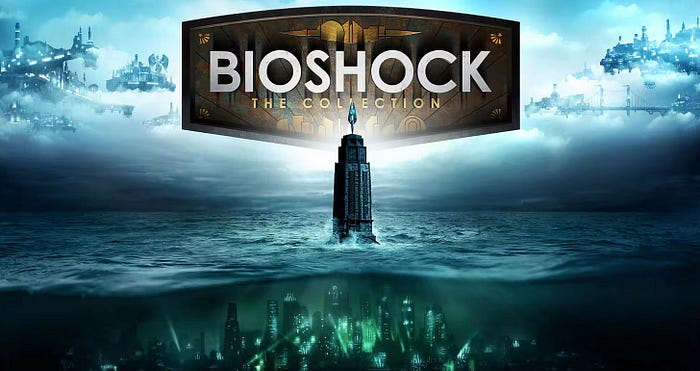
Q: As of this writing, the WGA Writer’s Strike is occurring. Can you explain what you see as some of the larger issues at stake (professionally and perhaps culturally)?
A lot has been written about this, but this really is an existential threat. Partially the streamers (Netflix, Amazon, Apple) have brought the anti-labor ethos of big tech to Hollywood. Two of those companies don’t even need their shows to do well, they’re just loss leaders for their core businesses. Partially it’s that they no longer have any incentive to actually make TV and movies — not just high art or award-winners, but literally shows and movies people want to see, period. It’s basically the rapacious private equity capitalism that’s hollowed out manufacturing and retail, now coming for entertainment. People like David Zaslav (he’s not the only one, just the most clumsily visible) just see it all as this great content maw, and whether they get the share price up with some weird tax-write-off fuckery or whether they sell tickets really does not matter.
Add to that that there’s the sort of syndrome wherein these c-suite types are experts in moving up within their own corporations but literally at nothing else — not management, not making deals, not their core business, nothing whatsoever — and we’re facing the abyss. Part of why they just want to have AI do everything is that they don’t actually understand why they’re paying creatives — horrible midjourney sludge or ChatGPT listicles aren’t any different to them than a regular piece of entertainment. I’m not talking about creative executives here, by the way — from everything I’ve gathered, they hate these trends as much or more as the writers do. I’m talking about the people who have taken over every industry, where they see their jobs as goosing the stock price, and that’s it. I’m not one of those weird classical economist guys who sees financialization as a distortion of some other, purer form of capitalism, but it is inescapable that this is something different, a mad system that follows its own bizarro logic and only tangentially connected, if at all, to the physical world of goods and services.
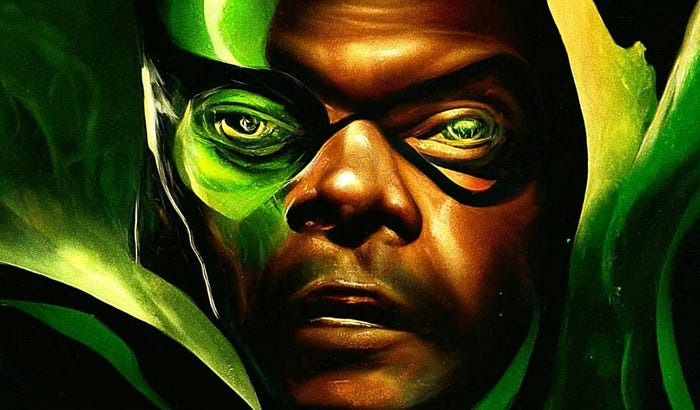
Of course, we live in a world of app slaves, home deliveries, infinite content libraries, and home gaming, so it could be that the powers that be see this as a transition away from storytelling or art into some new form of bread and circuses that doesn’t have all those pesky creators asking difficult questions about the lives we’re all leading. I guess it’s not really any different from when Nero had Seneca executed/suicided, though we’re still in the part wherein Seneca is fighting Nero and hopefully it’ll have a happier ending.
Practically speaking, this means that what was once a comfortably middle-class living, where if you could break in and were reasonably talented and personal, has become a gig job where you’re expected to be grateful to be there. I started relatively late, and got the tail end of it — two big writers rooms where we went to set and even the editing room on occasion — then a slightly smaller room where the set was in another country — then no more than five people. Then mini-rooms, which are a trick to get the same amount of material for a fraction of the money, basically have everyone do the story break for six weeks, let everyone go, and make one or two higher-ups finish it all. Unfortunately this has also coincided with greater attention to diversity in the industry. This is a typical pattern in American history — once we let women, queer people, and people of color in, you radically shrink it, so that everyone is fighting for the same table scraps. I’m very happy the union is bucking that trend — the answer is more jobs for more creators.
Q: With almost twenty years under your belt, how have your ambitions as a writer and artist changed?
I take a lot more joy in the process, and I don’t worry so much about what I’m leaving behind. Being a parent is much more important to me than being an artist, though I do need to keep working because I have no other skills and I can’t really wait tables at my age.
Many thanks to Jason Grote for taking the time to speak with me.
